Discover 31 powerful emotional self-care practices for women to boost mental well-being, reduce stress, and build resilience in your daily life.
For many of us, our days can get pretty busy and it can be hard to find time to practice self-care. But our emotional health is more important than most of us give it credit for.
Our emotions are responsible for how we view the world around us, and as a result, how we think and act. No matter what’s going on in our lives, our emotions are ever-present.
You can think of it like this. The world around us is painted in black and white. The things happening in our day-to-day lives are neutral. It’s our emotions that ascribe meaning to everything, they paint our experiences in a variety of colors, giving them positive and negative associations.
That’s why emotional self-care is so important. It is a tool we can use to manage our emotions and take care of our emotional needs so that we can paint our lives in vibrant rich colors, not just dark grays and blacks and blues.

What is Emotional Self-Care?
There are 5 main types of self-care, but emotional self-care is specifically focused on addressing our emotions.
To dive deeper into this topic, we first need to understand emotions a bit little better.
On a basic level, emotions are just mental states that direct our thoughts and behaviors.
They are critical in helping us understand the world around us. Certain emotions are even credited with helping us survive and evolve over time. For example, fear protects us from danger and helps us stay motivated.
Feeling and processing positive emotions comes naturally to most. However, when it comes to negative emotions like anger and sadness, we must learn how to react and process those feelings.
Recognizing and understanding what feelings we are experiencing is a necessary component of achieving emotional health and well-being.
Emotional self-care is the act of acknowledging and nurturing our inner feelings. It’s about understanding that a variety of emotions will always be present. What’s important is how we choose to react to and process them. Using a variety of self-care techniques can help us calm our nervous systems, cope with challenging situations, and boost our moods.
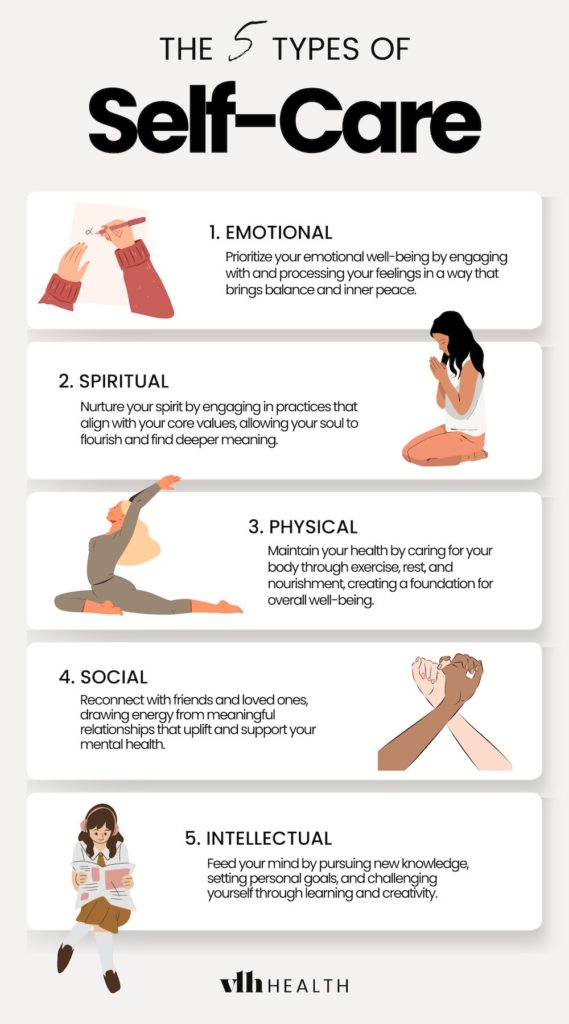
Why is Emotional Self-Care Important?
We cannot control the presence of emotions, we can only control how we react to them. When we cultivate high emotional wellness, we are better able to handle all of life’s stressors.
However, when we block out our emotions and don’t deal with them in a healthy manner, they can lead to all kinds of mental and physical ailments including depression, chronic stress, and anxiety.
Emotional self-care allows us to practice something psychologists call “emotional self-regulation.” It’s a technical term that refers to our ability to respond to emotions and involves the process of monitoring our feelings, evaluating their presence, and modulating our reactions toward them.
In a stressful situation, someone with good emotional self-regulation would keep their cool, collect pertinent information, and then decide the best course of action. Whereas someone with less emotional self-regulation might have an angry outburst.
This is often connected to our nervous systems.
Do you ever feel like you’re being oversensitive or overactive? This could be a sign of nervous system dysregulation.
The nervous system is responsible for all kinds of things but at its core, a balanced nervous system gives us the ability to move between different states of arousal in response to stressors.
Meaning that when we encounter a stressful situation, we can adapt without getting overwhelmed. It’s essential for navigating the world around us.
When we don’t practice self-care, we can end up putting a lot of stress on our nervous systems and they can become dysregulated.

FROM THE EXPERT
Dr. Linnea Passaler
“Nervous System Dysregulation is, in essence, overwhelm and translates into a sense of powerlessness. We feel we have no control over how we respond to triggers, and we remain stuck in that response even after the trigger is removed.
When our nervous system is chronically dysregulated, our bodies develop various symptoms and conditions. Being in our body may feel painful, uncomfortable, or even terrifying.
Trauma, burnout, illness, and chronic pain all stem from an overwhelmed nervous system.”
FROM THE EXPERT
Dr. Judy Ho
“Dysregulation most often presents as emotional symptoms, such as depression, anxiety, a pervasive sense of depletion, irritability, overreactions like tantrums, underreactions like shutting down, and difficulty shifting out of negative emotional states.”

So you can see why emotional self-care is so important! It allows us to manage our emotions and therefore live a happier, healthier life.
Why It’s Even More Important for Women
Historically, women have found themselves playing so many roles from caretaker to professional and partner. This juggling act puts an enormous amount of emotional pressure on us. This is why emotional self-care is even more important for women.
Beyond that, as compared to men, we tend to experience the world around us a bit differently in subtle and not-so-subtle ways. To name a few:
- Higher emotional labor: Women often bear the burden of not just their own emotions but also that of others. It often goes unnoticed but it can lead to emotional exhaustion if not well-managed.
- Unique hormonal fluctuations: Women experience hormonal changes on an ongoing basis that greatly affect their emotions. Certain feelings can become intensified such as sadness, stress, and irritability making it more difficult to keep our emotions in check.
- Tendency to Prioritize Others: Women often have a natural inclination to prioritize the needs of others before their own. Constantly putting others first can lead to emotional depletion which requires mindful self-care strategies to counteract.
How to Practice Emotional Self-Care?
The practice of emotional self-care can be broken down into four key steps. Through understanding this process, we can better select the self-care practices that are most essential to meeting our emotional needs.
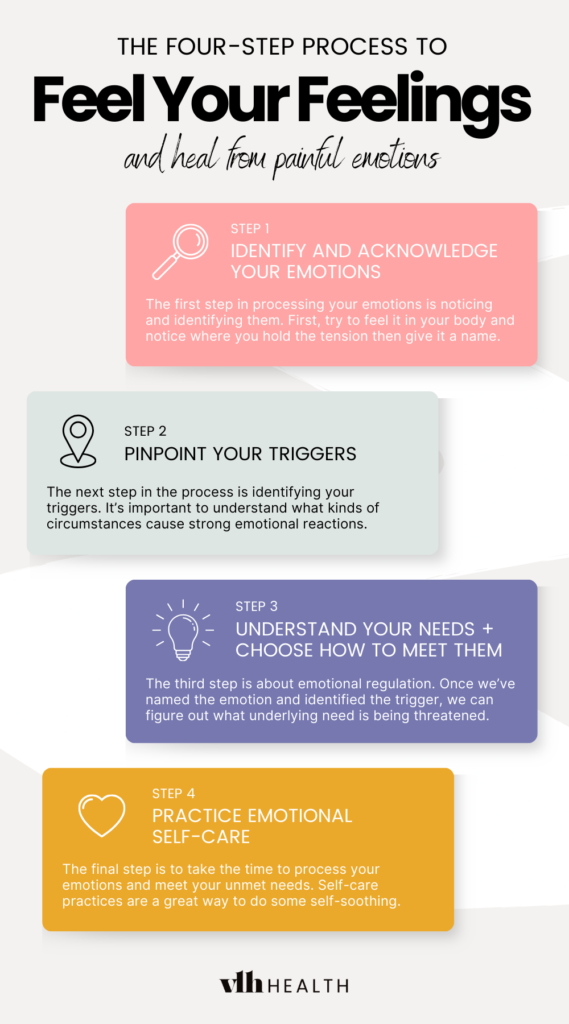
Step 1: Identify and acknowledge your emotions
The first step in meeting our own emotional needs is understanding what and why we are feeling a certain way.
For many of us, our immediate, and sometimes unconscious, reaction is to hold our emotions inside. Instead of facing them, we look the other way. When emotions are internalized instead of expressed, they can snowball into bigger issues down the road.
So your first step is to take a second and turn toward your emotion. Try to feel it in your body and then give it a name.
If you’re not used to this, this emotion chart might be helpful for you to reference every now and then:
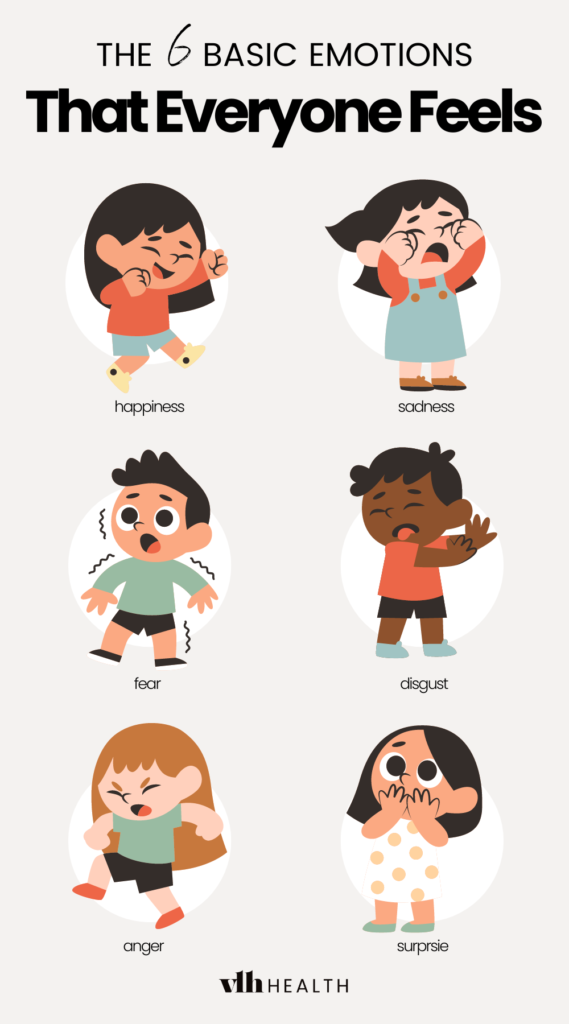
Step 2: Pinpoint your triggers
Now that you’ve identified and named your trigger, you can start to look for what might have triggered it.
What caused this feeling? Answering this question might be hard in the beginning but you will quickly start to notice patterns. Typically, we all have a few common triggers that most of our feelings connect back to.
Step 3: Understand your emotional needs and choose how to meet them
This step is all about regulation. You might find that normally when you get scared, you lash out with anger (whether that be directed toward someone else or yourself.)
This time, when you notice you’re scared and you’ve identified what caused that fear, you can take a second to think about which emotional need it connects back to.
More on that in a minute but, once you know what the root cause is, you can choose how to meet that emotional need.
Step 4: Practice emotional self-care
Here comes the fun part. Now you can make some mental space or some time to process your emotions and meet your own needs with some pampering and TLC.
Keep reading for a list of our favorite ideas for emotional self-care.
The 9 Basic Emotional Needs & How to Meet Them
According to the famous psychologist, Abraham Maslow, we all have 5 basic needs and when they are all met, well…then we’re living out our best, happiest, and most full lives!
We can use this framework to understand our emotional needs as well.
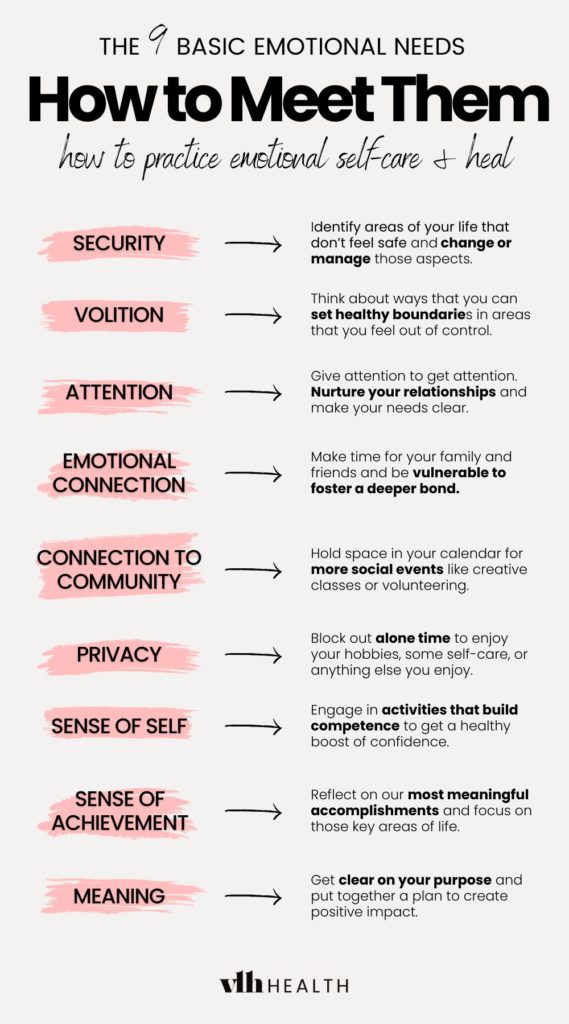
1. Security: our need to feel safe.
How to meet this need: Identify areas of your life where you don’t feel safe. Reflect on ways that you can reduce or better manage these triggers. For example, if you feel safe while at home, try installing a home security system to alleviate the fear.
It’s important to know that stress is a threat response. So anytime you feel stressed, you are reacting to some real or perceived threat, often to your safety. If you think deeply about most of your negative emotions, you will realize that they often connect back to stress, and therefore our need to feel safe.
2. Volition: our need for autonomy, the feeling that we are in control of our own lives.
How to meet this need: Identify areas of your life where you feel like you don’t have control. Think about ways that you might be able to maintain more power over the situation. For example, if you have a controlling parent or partner, you can learn to set better boundaries to protect your need for autonomy.
3. Attention: our need for adequate attention from people around us and ourselves.
How to meet this need: Prioritize time with the people that matter most to you. If you feel like you are not getting attention from them, it could be because you are not giving attention. Nurture your connections and if you still feel something is lacking, find a way to ask for what you need. For example, if you feel like your partner doesn’t give you the attention you need, first try giving them more attention. Plan dates, listen carefully to what they tell you, and spend quality time together. If you don’t feel like your efforts are returned, have an open and honest conversation about it.
4. Emotional Connection: The need to feel connected to the people around us.
How to meet this need: If you are feeling lonely or disconnected from the world around you, you might be feeling a lack of emotional connection. Similar to attention, this is a two-way street. Try nurturing your friendships and romantic relationships. Be brave and vulnerable, it will most likely be returned to you as well cultivating a sense of emotional connection with others. For example, if you are feeling disconnected from your parents, try opening up to them about something going on in your life that they might be able to relate to.
5. Connection to Community: The need for social interaction.
How to meet this need: Similar to the need for attention and emotional connection, we have a need for community. This can mean our family and friends, but it can also mean our broader community like our neighborhood, our place of work, or things related to personal interests. If you are feeling this need, make some extra space for social events in your calendar. Try volunteering, mentoring, special interest groups, and specialized classes or courses.
6. Privacy: The need for time and space to ourselves.
How to meet this need: Believe it or not, privacy is a basic human need. Not only do we crave alone time, we actually need it. So here’s your formal reminder to set boundaries so that you can integrate a certain amount of private time into your weekly schedule. Many of the ideas for emotional self-care involve a bit of solo pampering so why not block some time each week to try something new?
7. A Sense of Self: The need for a sense of value and purpose
How to meet this need: In order to cultivate a strong sense of self, we need to engage in activities that build competence and confidence. So whether it be a professional skill or hobby, dedicate some time to becoming an expert and enjoy the confidence boost in the process.
You can also practice some morning affirmations to encourage a strong sense of self-worth.
8. A Sense of Achievement: The need for self-esteem.
How to meet this need: In today’s world the pressures for achievement seem at times unbearable. But deep down we all have a need for feeling accomplished. It’s often referred to as a form of external validation which can get a bit tricky. However, a sense of achievement can also come from within. Reflect on the achievements that have made you feel the most proud. Try to disconnect from what society values and think about your own experience. Come up with a plan to focus on and strengthen these areas of your life further.
9. Meaning: The need to feel like we are part of something bigger than ourselves.
How to meet this need: Similar to the above exercise, reflect on the things that give your life meaning. They can be big or small, in fact, many happiness experts say that the secret to happiness lies in the smallest of life experiences such as enjoying a cup of tea or feeling gratitude for the fresh air you breathe.
Now that you understand these 9 basic emotional needs, do you feel more prepared to take care of your emotional health? Whether you’re just dipping your toe in the water or doing a full cannonball, understanding that we all share common needs can be a powerful tool in managing our mental health and well-being.
Your Brain’s 3 Emotion Regulation Systems
If you’re still finding it hard to identify with your emotions, you might find this model helpful.
As we mentioned earlier, emotions serve many very important roles but they are also capable of creating a lot of negativity and suffering.
Professor Paul Gilbert theorizes that we have 3 main emotional regulation systems. Although each of us uses all three, we can get caught in a particular pattern leading us to develop unhealthy or unbalanced emotional coping mechanisms.
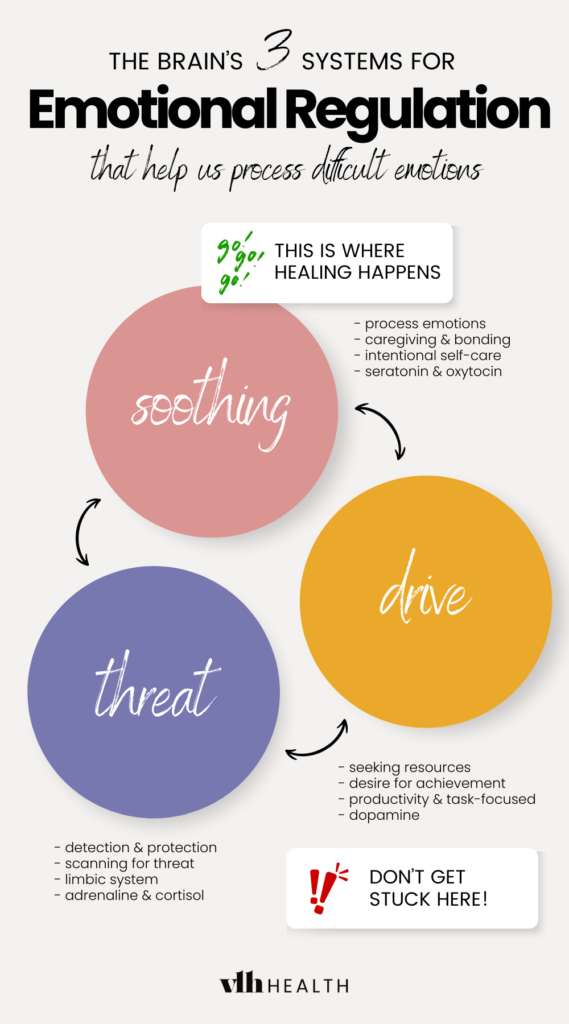
Each of us has a threat system, a drive system, and a soothing system. They each present us with different ways we can go about processing an event or emotion.
When a real or imagined threat appears, the body reacts in all kinds of ways to prepare us to fight, flight, or freeze, or engage in self-attacking or self-criticism. This is the “threat” system of emotional regulation and is often associated with emotions such as stress and anxiety.
The “drive” system is responsible for providing the motivation we need to address the threat. It takes us from this initial fight, flight, or freeze response into a goal-directed space. This is the how can I fix this or make it disappear system. It’s highly influenced by dopamine which is a mechanism our body uses to motivate us to seek safety and pleasure.
Lastly is the soothing system, and this is the space that we often neglect or forget. Many of us live in this “threat” space frozen by fear and anxiety or overuse our “drive” system to chase dopamine, therefore neglecting to thoroughly process our emotions.
The “soothing” system is the land of nurturing and caregiving. When we enter into this space, we feel safe, calm, peaceful, and content. Self-care allows us to soothe ourselves and to activate this emotional regulation system. It’s through these self-soothing practices that we can heal and process our emotions in a healthy way.
31 Ideas for Emotional Self-Care
As we’ve seen in the past sections, dealing with our emotions is a complicated task that involves a deeper understanding of our inner world. As much as we wish it were true, a bubble bath does not fix all problems.
That’s why we’ve broken down our ideas for emotional self-care into 5 key pillars. Each of the pillars represents a core element of health and well-being as they connect back to our emotions.
So let’s dive into the emotional self-care list below.
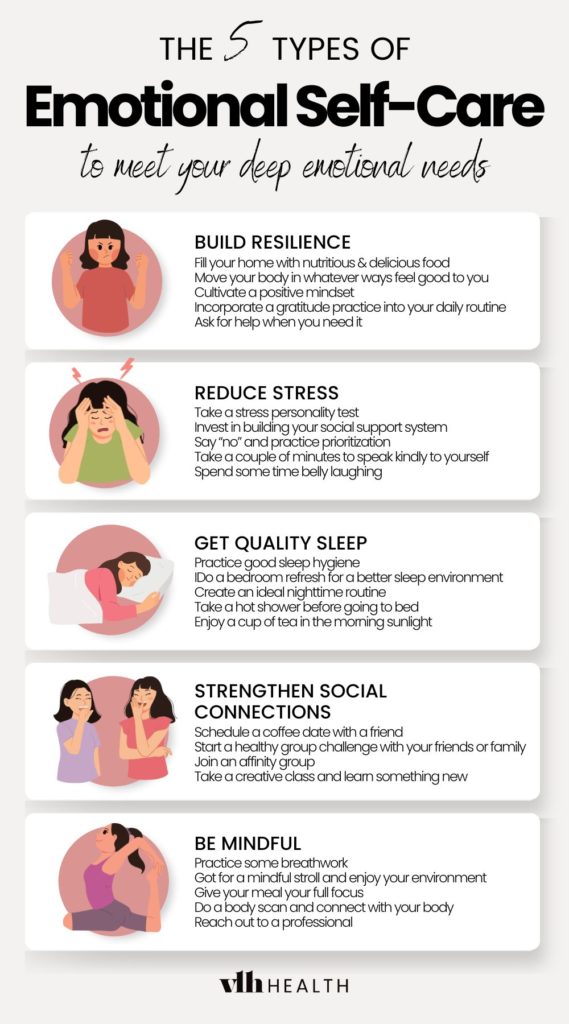
Pillar 1: Build Resilience
People who have high emotional well-being bounce back from difficult situations more quickly than others. They spend more time with their positive feelings and less time dwelling on the negative.
- Fill your home with delicious and nutritious food. Eating healthy is an incredible way to take care of our bodies and brains. Whether you take the time to go grocery shopping, meal prep for the week, or simply pick up some ready-made healthy options, filling your home with powerful fuel will improve every aspect of your life.
- Move your body. In today’s world, it can feel like a lot of pressure to go to the latest hit class or be the first to the gym at 5 am. While we’re not saying those things are unhealthy, daily movement is the most important of all. Find something you love and do it every day.
- Take time for yourself every day. Whatever you enjoy most, make time for it every single day. Whether that be a hobby, a mindfulness practice, or a small part of your daily routine nurturing small moments of pleasure is key to emotional regulation.
- Cultivate a positive mindset. No matter how lucky you are, everyone encounters challenging situations, big and small. One of the best ways to change your life is to change your outlook. Start small by changing “I have to do this” to “I get to do this.” In scientific terms, this is called positive reappraisal. It’s the process of re-evaluating a negative event by drawing on positive emotions, helping us to find value in the situation.
- Practice gratitude. Incorporate a short gratitude practice into your morning or evening routine. Reflecting on what we’re thankful for helps us shift from a mindset of scarcity to one of abundance.
- Do something that feeds your inner purpose. Whatever your purpose may be, it’s important to honor your inner compass and do the things that give your life meaning. Whether your purpose is to raise healthy and happy children or save the bees, carve out time to make an impact.
- Ask for help. Whether you need help from a friend or a mental health professional, it’s so important to ask for help when we need it.
Pillar 2: Reduce Stress
Stress is inevitable, there is no way to completely eliminate it from your life. But many of us have developed some level of “chronic stress” where we get stuck in fight or flight mode permanently. Take some time to practice self-soothing and reduce stress and anxiety.
- Take the Stress Personality Test. There’s no way to avoid having some stress in life, but managing it is an important skill that so few of us learn to do well. Sometimes the first step is just to understand it better. This test helps you understand your underlying stress-coping mechanisms.
- Sleep it off. Stress often involves a dump of adrenaline, a hormone designed to give us energy which can lead us to not getting enough hours or zzzs. But one of the best ways to combat stress is to get 7 or more hours of sleep each night.
- Build a social support system. It’s easy to feel like we’re in it alone but more often than not there are people around us who can support us. Next time you’re feeling stressed try to think about “we” instead of “me.”
- Practice prioritization. When was the last time you said “no”? Here’s a self-care tip you won’t hear everywhere, practice the powerful “no” so that you can focus on what’s really important.
- Speak kindly to yourself. At the end of the day, take a couple of minutes to practice compassion for yourself. Reflect on all the things you did well and how you showed up for yourself and others.
- Do something relaxing. Okay so maybe there is space for a bubble bath or two? Scheduling regular relaxing activities is essential for nervous system regulation. You can try some breathing exercises or an at-home spa night.
- Force a smile. It might sound counterintuitive, but sometimes just forcing out a smile can have a positive effect on reducing stress levels. Don’t trust me? Just check the science.
- Spend some time belly-laughing. Just like smiling, laughing releases all kinds of feel-good hormones which both calm down the stress response and soothe tension. So here’s your excuse to put on an episode of your favorite sitcom.
Pillar 3: Quality Sleep
The easiest way to improve every aspect of your health, including your emotional health, is getting more sleep. Sleep is such a foundational aspect of wellness but the demands of life pose a constant threat to those precious 8 hours. Use some self-care time to work on your sleep and you’ll notice the benefits right away. It’s incredible what one great night of sleep can do.
- Practice good sleep hygiene. Not all sleep is created equal. Take some time to make one optimization to your sleep hygiene and reap the benefits each night going forward.
- Do a little bedroom refresh. NASA set out to understand how to optimize our environment to get the best quality sleep as part of the spaceship design program. In this post, we’ve applied all their insights into suggestions for refreshing your bedroom to get your best night’s sleep. Why not spend a couple of hours giving your sleeping environment a little makeup?
- Create an ideal nighttime routine. One of the secrets to a good night’s sleep is a consistent nighttime routine. Whether you’re flying blind or are ready to take it to the next level, spend some time thinking about your ideal nighttime routine and then put it into practice.
- Take a hot shower before bed. As our body prepares for sleep, our temperature naturally drops a degree or two. We can simulate this effect by taking a hot shower or bath before bed. The hot water will raise our external body temperature and until we step out then it will drop back down a bit which can artificially signal to our body that it’s time for sleep.
- Have a cup of tea in the morning sun. Getting some sunlight within 30 minutes of waking up stimulates the production of vitamin D and helps to regulate our circadian rhythm leading to a better night’s sleep to follow.
Pillar 4: Strengthen Social Connections
Recently there’s been a lot of talk about the importance of social connections. In fact, one study even suggested that one of the reasons men don’t live as long is that they invest less in their social networks as they get older. But this key aspect doesn’t just affect longevity, it also impacts our emotional health in big ways.
- Schedule a coffee date. Building strong relationships is one of the best ways to support our emotional health. Investing and nurturing our relationships can take some effort but sometimes it’s as easy as scheduling a coffee date.
- Start a group challenge. Find a group of like-minded people, whether it be family, friends, or otherwise, and engage in a challenge together. It could be a gratitude challenge or even a 5K.
- Join an affinity group. No matter what you’re into, there is a club for you. Book clubs, sports clubs, knitting clubs, and hiking clubs…your options are endless and there couldn’t be a better way to meet people who share your interests.
- Take a class. If you’re feeling adventurous, why not try something new? There are all kinds of interesting classes available from pottery to language classes and dance lessons,
- Volunteer for things you care about. Volunteering is a great way to release all kinds of feel-good hormones. There is nothing quite like the feeling of finishing up a shift and reflecting on the difference you made in the lives of others. Choose something that connects to your greater purpose whether that be volunteering at the animal shelter or mentoring disadvantaged youth.
- Plan a solo trip. Traveling solo is an incredible way to meet new people and experience new things. There’s nothing like a funny (and maybe tragic) travel adventure gone wrong to bond two people.
Pillar 5: Be Mindful
Mindfulness has become quite a buzzword in the past couple of years with an absolute proliferation of different mindfulness practices and products. But being mindful is an incredibly simple thing to do, though not always easy. As part of your holistic emotional self-care, incorporate some mindfulness strategies, big or small.
- Practice some breathwork. Even if you only have two minutes to spare, a couple of rounds of box breathing can dramatically impact your emotional well-being. Try to make it a daily practice by habit stacking it with something like taking a shower or making a coffee.
- Go for a stroll. But this time, leave the headphones at home. As you walk, try to take in everything around you from the smell of the air to the sound of the leaves under your feet to the feeling of crisp air on your cheeks.
- Give your meal your full focus. It’s so tempting to want to multitask while eating. Why not get a bit of extra work done or pop on a show? While this is totally fine once and a while, eating mindfully is a practice that can help you connect more deeply with your body. Enjoy a nice slow meal and notice every bite you take.
- Do a body scan. Build some bodily awareness with a body scan. To do it just start at your feet and slowly mentally scan each part of your body moving up to your head. Notice how each body part feels.
- Connect with a professional. We often go through life just figuring it out. And while that’s not always a bad approach, there are experts available to us to make all kinds of things easier. If you find yourself in need of help or guidance, reach out and seek the expertise you need.
Final Thoughts
We take care of ourselves in many ways but an often-forgotten way is nurturing our emotional health.
Especially as women, it’s vital to nurture and cultivate emotional wellness so that we can take care of ourselves on top of everything else that we juggle.
We hope that you found this deep dive into emotional self-care valuable and that it helps you become the woman you dream of being, in all aspects of life.
Please let us know in the comments below if we missed any of your favorite emotional self-care activities.
Happy pampering,

A small note for my readers – Over here at VLHhealth, we occasionally include affiliate links in our posts. This means that if you purchase using our links, we will earn a small commission at no extra cost to you.
More ideas you’ll love
- 67 Small Ways to Romanticize Your Life & Why To Do It
- The 5 Best Home Bedroom Refresh Ideas to Create Your Ultimate Sleep Sanctuary
- 53 Period Self Care Ideas: What To Do On Your Period At Home
Pin for later!

Sources
My Mental Health Guide, Emotional Self-Care
https://www.mymentalhealth.guide/self-care/emotional-self-care
CDC, Taking Care of Your Emotional Health
https://emergency.cdc.gov/coping/selfcare.asp
Choosing Therapy, 11 Ways to Practice Emotional Self-Care
https://www.choosingtherapy.com/emotional-self-care
National Institutes of Health, Emotional Wellness Toolkit
https://www.nih.gov/health-information/emotional-wellness-toolkit
Heal Your Nervous System, Nervous System Regulation: How to Start Regulating Your Nervous System
https://healyournervoussystem.com/nervous-system-regulation-how-to-start-regulating-your-nervous-system
Advantage Care, Emotional Self-Care: What It Is and How to Make It Part of Your Life
https://advantagecaredtc.org/emotional-self-care/
Mind Body Green, 9 Basic Emotional Needs Everyone Has & How To Meet Them
https://www.mindbodygreen.com/articles/9-emotional-needs-according-to-maslow-s-hierarchy
Mindfulness & Clinical Psychology Solutions, Your Brain’s 3 Emotion Regulation Systems
https://mi-psych.com.au/your-brains-3-emotion-regulation-systems/#about
News in Health, Positive Emotions and Your Health: Developing a Brighter Outlook
https://newsinhealth.nih.gov/2015/08/positive-emotions-your-health



Leave a Reply